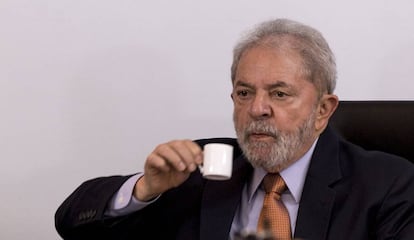“If a political conviction stopped Lula from running, that would be fraud”
A Brazilian court will soon decide if it confirms or overrules Lula’s nine-year prison sentence

Brazilian politician Luiz Inácio Lula da Silva raises his voice and proclaims: “I have the peace of the innocent, they have the peace of liars. They know they are lying. Those who are accusing me know that one day their son is going to wake up and ask: ‘Dad, why did you lie about Lula?’.”
It’s a reference to accusations, confirmed by the court that convicted him, that Lula accepted a luxury apartment in Guarujá, on the coast of São Paulo, from the construction company OAS, one of the firms at the center of the Petrobras scandal. He was found guilty by Judge Sergio Moro, head of the massive Lava Jato corruption investigation, and sentenced to nine years in prison.
But Lula has denied ownership of the three-floor condo, and his lawyers have dismissed the charges as a political plot to stymie his political comeback. On January 24, the former president of Brazil will appear before the court to appeal the verdict. A negative decision would squash Lula’s hopes of running in the next presidential elections in October as leader of the Workers’ Party (PT).
But the 72-year-old says he will fight until the end. Not just for the right to run, but also to defend his “honor” and force those who have accused him to “apologize.”
Question. Why do you insist that politics is the only motive behind this trial?
Answer. Everything began with a lie, a news article in O Globo which said that the apartment was mine. From that moment on, the police, prosecutors, Judge Moro furthered the untrue accusation. The way everything has happened makes me believe we are facing a case that is more political than legal … I cannot be the owner of anything if they can’t present proof of payment or acquisition, any proof that the apartment is mine … Nobody has presented this documentation, which is why I am led to say that they are lying, that there is a strong political component to this case, mixed in with hate.
Q. If you are convicted, will you continue to campaign or desist?
A. I don’t know the word desist and I don’t use it. I am convinced that the Brazilian people know that this country can grow again, create employment, move forward.
Q. So, you will continue fighting until the end to reach the elections even if you are convicted?
A. I am going to keep fighting because I want to live until I am 120 years old, to be strong, healthy and in good humor. I don’t see January 24 as D-Day, it is just the date of the trial. There are nine or eight more cases … I am not fighting to be a candidate, I am not trying to be a candidate so I can be acquitted, I am fighting to prove my innocence. I will continue traveling across Brazil, presenting my evidence, speaking of politics and if the PT wants me to be their candidate, I will. If the justice system wants to challenge me, that’s another problem, but there will be processes and appeals… I will not stop speaking with the Brazilian people, it is my destiny.
Q. Do you agree with PT leaders who say elections without Lula would be fraudulent?
A. There have been lots of elections without Lula. The problem isn’t Lula. The problem is democracy. Trying to build a legal case against someone so they can’t be a candidate is not very democratic. It’s not just the PT that is saying elections without me would be fraudulent, it’s a campaign involving lots of parties and social movements. If Lula is banned from being a candidate because of a politically-motivated decision from the courts, they would be committing fraud. Why is Lula being stopped? If I had 1% approval rating in the polls, nobody would try to stop me. The people would stop me.
Q. You don’t think you are giving off the idea that you are above justice?
A. No, the opposite. If I did not believe in justice, I would not be democratic. But justice must be apolitical, it must act in accordance with the Constitution and not with a person’s beliefs. Here they have invented the theory of “I don’t have proof but I have my convictions.”
Q. You speak of political persecution but the right in Brazil have also been investigated for corruption.
A. Because the problem was so overwhelming it couldn’t be hidden any more. But the first two years of the Car Wash investigation focused only on the PT. Then the Brazilian people began to demand answers. And luckily, thanks to the internet, they became aware of many things that were not published by the press … We have reached a point where we cannot stop investigations into corruption until we change our culture. But we must do this in respect of the Constitution, without lowering justice to a trial by media, which is what has happened here. Corruption is not just a problem in Brazil. There is corruption in the United States, Germany, France … Here we turn it into a giant carnival.
Q. There is a lot of anger in Brazil and some of it directed against you. Where does this hate come from? From the corruption cases?
A. We did something which I believe ended up creating a certain level of hate: we lifted a significant portion of the poorest people in Brazil out of poverty. Thirty-six million people were raised out of poverty, we transformed them into citizens with rights who before had none. Everything that until then was off limits to 35% of the population became accessible to all. And I believe that’s why part of society, which doesn’t know how to share these public spaces, which doesn’t believe in democracy or in alternating power, has created this hatred. And I am going to be a candidate precisely so I can get rid of this hate and give back peace to the Brazilian people.
English version by Melissa Kitson.
Tu suscripción se está usando en otro dispositivo
¿Quieres añadir otro usuario a tu suscripción?
Si continúas leyendo en este dispositivo, no se podrá leer en el otro.
FlechaTu suscripción se está usando en otro dispositivo y solo puedes acceder a EL PAÍS desde un dispositivo a la vez.
Si quieres compartir tu cuenta, cambia tu suscripción a la modalidad Premium, así podrás añadir otro usuario. Cada uno accederá con su propia cuenta de email, lo que os permitirá personalizar vuestra experiencia en EL PAÍS.
¿Tienes una suscripción de empresa? Accede aquí para contratar más cuentas.
En el caso de no saber quién está usando tu cuenta, te recomendamos cambiar tu contraseña aquí.
Si decides continuar compartiendo tu cuenta, este mensaje se mostrará en tu dispositivo y en el de la otra persona que está usando tu cuenta de forma indefinida, afectando a tu experiencia de lectura. Puedes consultar aquí los términos y condiciones de la suscripción digital.









































